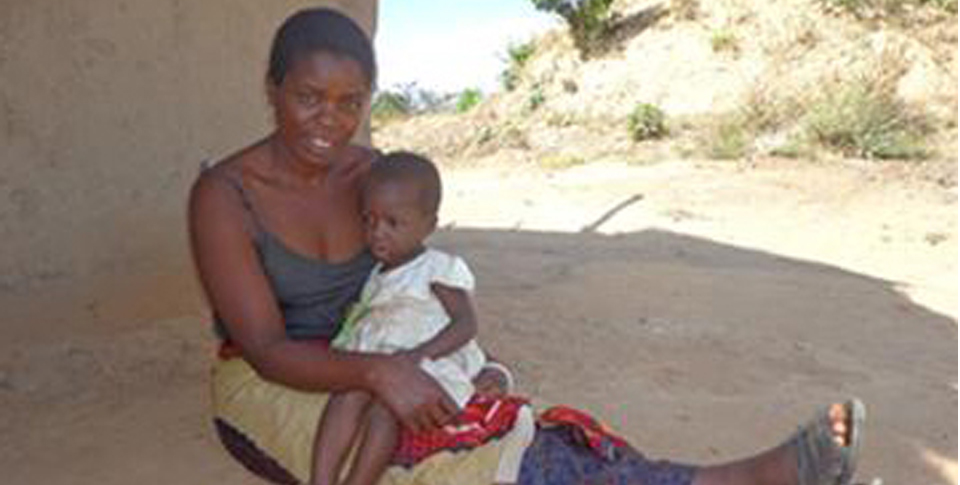Maria Mateyo is a good mother. The young woman from Chinkewende village in Malawi works alongside her husband, Mateyo, to grow crops in their field. She cooks the family’s meals and keeps her home clean. When she gave birth to Memory, her first child, Maria also breastfed her child exclusively to make sure that her immunities were passed on.
 Maria Mateyo and Memory |
Despite all these efforts, when Maria began to wean Memory at eight months, the child’s health decreased dramatically. The first two years of a child’s life are crucial for proper physical and mental development, yet despite regular meals Memory was not receiving adequate nutrition to grow properly.
This situation is not uncommon. In much of Malawi, children are stunted due to malnutrition in their first years of life. To combat this, World Renew is working with its partner, the Nkhoma Relief and Development (NRD) department of Presbyterian Church of Central Africa, to implement a child and maternal health program thanks to funding from the Canadian Department of Foreign Affairs, Trade and Development (DFATD). One of the key facets of this program is teaching parents about better nutrition.
“One major problem we noticed in communities like Chinkewende was malnutrition, which contributed to stunted growth of children under two,” said William Chalira, Maternal, Newborn and Child Health District Supervisor for World Renew in Ntchisi. “Upon doing some community assessments and focus group discussions we discovered that the reason for this stunting was not lack of food, but something beyond that.”
In villages like Chinkewende, families have a variety of food crops in their fields ranging from maize, soy beans, groundnuts and beans. They also have livestock such as chickens and goats and separate vegetable gardens to supplement what they grow in their fields. It was not lack of food that was causing poor nutrition. Instead, poor food preparation, storage and utilization were causing poor nutrition.
There was also a gender dynamic to this issue. Women were the ones who prepared food, but they were only allowed to cook with grains and vegetables. If they wanted to use eggs or livestock, they needed permission from the men of their household and these men were often hesitant to “reduce their wealth” for the sake of feeding their families.
In order to address these issues, World Renew and NRD conducted several community trainings about the importance of good nutrition and food handling. Men were encouraged to be proactive in improving the health of their wives and children. Once the men were on board, World Renew and its partners also led trainings on how to utilize locally-available foods to produce a variety of healthy and nutritious meals.
Both men and women were invited to attend these food preparation classes and were encouraged to participate in the actual cooking. During the class, a volunteer instructor showed families how to prepare different types of porridges that contained no less than four food groups, as well as how to cook main dishes, snacks and juices using local ingredients.
Kondwani Banda was the community health volunteer who taught Maria and Mateyo’s community about nutrition. He led cooking demonstrations every week for two months. He also encouraged Maria, Mateyo and the other community members to continue practicing these new cooking methods at home. Each week, Kondwani would visit the homes of the participating families to ensure that they were using the techniques and that their children were benefiting.
When he monitored Memory, he saw that her health was improving. By the third month, she had gained weight and was back in the “healthy” range for her age.
“We are more than grateful to Mr. Banda for the help he has given us,” said Maria. “We thought we were going to lose our child. We didn’t know what to do because we didn’t have the knowledge and support we needed. Through this program where they taught us to cook using local food that we already had in our homes, we managed to save the life of our child, Memory.”
The DFTAD supported Maternal and Child Health program in Malawi is currently in its third year and will conclude in April 2015. It currently has a total of 320 volunteers like Kondwani Banda and is reaching 5,120 families.
Through the use of community awareness campaigns, household visits and coordination with District government health officials the program also promotes the use of community health services, proper access to health services, good collaboration between communities and health services providers, and the prevention of malaria.
While the DFATD supported program will end in April 2015, World Renew and NRD will continue their work in maternal and child health after this project is over.
